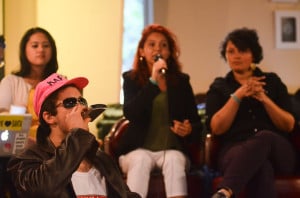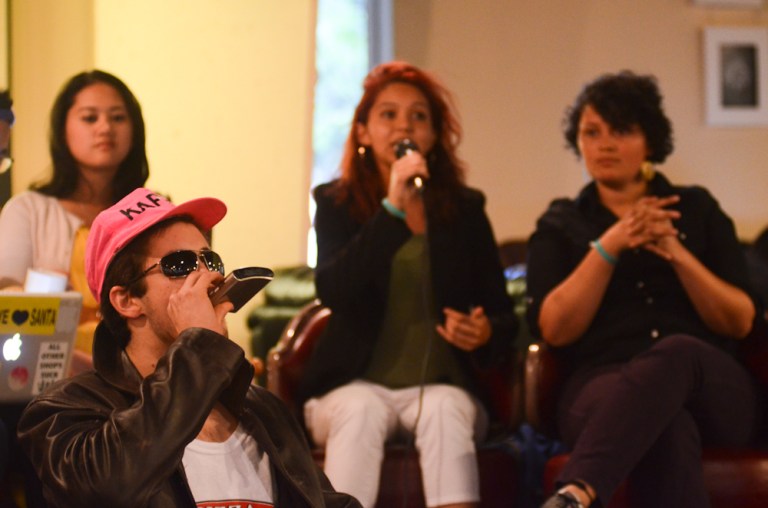In an engaged and occasionally bizarre debate on Monday night at the CoHo, this year’s three ASSU Executive candidate slates discussed and sparred over supporting mental health initiatives on campus, increasing student feedback in administrative decisions and improving the reputation of the ASSU.

The debate, held two days before voting opens, was moderated by Miles Bennett-Smith ’13, editor in chief of The Daily, and Judith Romea ’14, editor in chief of The Stanford Review.
The moderators began with a period of general questioning before directing specific questions at the three slates: Gallagher-Ashton, Gomez-Patiño and A Pedagogy of Self Discovery, The Chaparral’s joke slate.
The Chaparral slate, composed of Ryan De Taboada ’14 and Anthony So ’14, said little of substance, instead claiming that they were robots and arguing that the ASSU should be abolished.
“You know us as the robot candidates for student government, but we’re also the party candidates,” De Taboada joked.
Throughout the debate, Gallagher ’14 and Ashton ’14 emphasized their leadership experience within the ASSU and in other student organizations, including The Daily, Los Hermanos and Kappa Sigma.
“I’ve done a lot of different things and have a lot of experience meeting with really cool administrators,” Ashton, last year’s deputy chair of the ASSU Undergraduate Senate, said. “The ASSU is broken, and we have the experience to make it more relevant.”
Gallagher is a Daily staffer, and Ashton is a member of The Daily’s Board of Directors.
Gomez ’14 and Patiño ’14 also referenced their experience with student groups and communities, including the First-Generation Low Income Partnership (FLIP), El Centro Chicano and Movimiento Estudiantil Chicano de Aztlan (MEChA).
“What inspired me to run for the position of ASSU Executive has really been my involvement in different student groups,” Gomez said. “Many student groups on campus do a lot of great advocacy work and would love for the ASSU be another leverage point for them to really push [the] administration to meet student needs.”
In the general question session, Bennett-Smith and Romea asked the slates about major campus life topics, as well as issues specific to student government, such as engaging more upperclassmen in the ASSU, bridging the gap between the ASSU and the administration and dealing with unspent special fees.
While Gallagher-Ashton and Gomez-Patiño shared similar views about the importance of improving the efficiency and relevance of the ASSU, they expressed conflicting beliefs on the ASSU’s role in decisions regarding divestment, with the former slate arguing that the ASSU should not be involved in divestment debates.
“The ASSU should not divide campus, but bring it together,” Ashton said. “I think that unless there is a general consensus, the ASSU should not touch any issue of international importance.”
Gomez and Patiño countered that the ASSU should facilitate debate about international conflicts such as divestment.
“We believe that if students feel passionately about an issue, they should be able to come to the ASSU,” Gomez said. “We should really be discussing issues that go beyond the bubble of Stanford and that really do impact us as students. I don’t think a complex issue like divestment is beyond the student body to comprehend and take a side on.”
Following the general question session, further questions were directed at specific slates about their platforms.
Romea questioned Gomez and Patiño about whether or not their plan to establish more advisory boards and institutions to solicit student feedback would contribute to the bureaucratic and largely inefficient nature of the ASSU.
Gomez answered that, if elected, she and Patiño plan to implement student advisory committees specific to Residential and Dining Enterprises (R&DE) and Residential Education (ResEd).
“Currently there is no student input into a lot of the decisions made regarding housing on campus,” Gomez said. “Making sure the student voice is heard on that level is not something we would have to add a lot of work to because we already have a University committee system.”
Bennett-Smith asked Gallagher and Ashton whether or not they believed it was the role of the Executive to promote structural change within the ASSU, citing their proposed amendment to funnel unspent special fees money into a fund controlled by the Senate and Executive.
“Absolutely, it’s the role of the ASSU to be part of these amendments and referendums and suggesting structural reform,” Gallagher said. “Typically, the ASSU insiders know the most about the actual inner workings and structure and what would work and what wouldn’t work.”
Following repeated incidents of unruly behavior from the Chaparral slate, Bennett-Smith questioned De Taboada and So about whether or not their presence at the debate diminished the reputation of the ASSU by “making a mockery of the debate and the election process.”
“People have been pretty rude to us, to be fair,” De Taboada said. “You can say that our positions are unreasonable that we would give everyone our salaries, but then again a $20,000 salary for someone who doesn’t really do anything is also unreasonable.”
To get an overview of the debates and an introduction to each slate, check out our video here where we interview all three slates.
